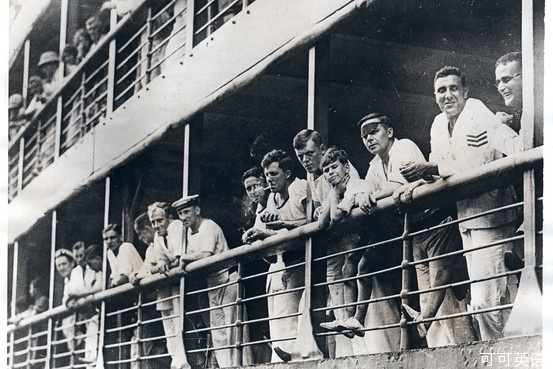(单词翻译:单击)

All Steven Schwankert wanted to do was dive a wreck off China’s coast.
最初,史蒂文・施万克特(Steven Schwankert)只是想在中国沿海进行一次沉船潜水。
Instead, the Beijing journalist and scuba instructor stumbled upon the mystery of a missing submarine, man’s first use of scuba equipment to escape from certain death, and an island graveyard that was hidden in plain sight.
但这位驻北京的记者兼潜水教练却偶然发现了一艘沉没的潜艇,以及一个明明就在那里但却没人发现的岛上墓地。在这次沉船事件中,水下呼吸器首次被用于逃生。
The story surrounding that mystery is now the subject of a book by Mr. Schwankert, “Poseidon: China’s Secret Salvage of Britain’s Lost Submarine,” and a documentary, “The Poseidon Project,” by British filmmakers and brothers, Arthur and Luther Jones.
围绕这个秘密的故事现在成为施万克特所写的《海神号:中国秘密打捞英国沉没潜艇始末》(Poseidon: China's Secret Salvage of Britain's Lost Submarine)一书的主题,同时也是英国导演阿瑟・琼斯(Arthur Jones)和卢瑟・琼斯(Luther Jones)兄弟执导的纪录片《海神号事件》(The Poseidon Project)的主题。
Both tell the story of the HMS Poseidon, a British submarine that collided with a freighter in China’s Bohai Sea in June of 1931 and sank in five minutes. Five men ultimately survived the wreck (in addition to the men who abandoned ship before it sunk) by using a prototype of today’s modern scuba gear. Their bravery is one of the compelling stories of the book.
这两个作品讲述的都是关于海神号的故事。1931年6月,这艘英国潜艇与一艘货船在中国渤海相撞,并在5分钟内沉没。这艘潜艇上有五个海军士兵(不包括在潜艇沉没前弃船逃生的人)通过使用现代水肺的原型成功逃生。他们的英勇事迹是这本书中具有吸引力的故事之一。
But it’s not the only moment of drama. Mr. Schwankert, editor of Beijinger magazine and founder of the diving company SinoScuba, vividly describes the process of finding out what exactly happened to the sunken submarine. He tracked the whereabouts of the remains of the men who died in the accident, and learned the sad story of others who perished in the escape efforts.
但这并非唯一的戏剧性时刻。施万克特是《北京人》(Beijinger)杂志的编辑,并且是水肺潜水训练中心SinoScuba的创始人。他生动的描写了发现这艘沉没的潜艇究竟发生过什么的过程。他曾追踪此次事故遇难者遗体的下落,并发现了有关其他一些在逃生过程中死亡的人的悲伤故事。
Mr. Schwankert highlights the story of the man he says is the story’s hero, Petty Officer Patrick Willis. The book opens with a dramatic scene of Mr. Willis leading the six men and two young Chinese mates’ assistants in the forward torpedo room of the downed submarine in a prayer as they feel the cold water rising on their bodies.
施万克特以浓重笔墨描写了其中一个名叫帕特里克・威利斯(Patrick Willis)的海军士官的故事,他说威利斯是这个故事中的英雄。这本书以一个戏剧性场面作为开头,当时威利斯带着五个士兵和两个年轻的中国大副助手在艏鱼雷舱祈祷,当时他们感觉到冰冷的水在他们周围不断上涨。
The room had to be flooded so that the men could open the escape hatch and try to make their way to the surface, 126 feet (38 meters) up. And as Mr. Schwankert writes, “The submariners had no choice but to contemplate doing something that no one had ever done before: rescuing themselves from a downed submarine using an experimental breathing device.”
只有这个舱充满水,他们才能打开安全舱口,并设法回到距离他们有38米的水面上。施万克特写道,这些潜艇人员不得不考虑去做他们以前从未做过的事:使用一个实验性的呼吸器从一艘沉没的潜艇中自救。
Adding to the tension, the room offered just seven sets of Davis Submerged Escape Apparatus, an early scuba technology called a rebreather, for eight people. Mr. Willis gave the seven devices to the six navy men and one of the Chinese boys. The other boy, Ho Shung, was described by several accounts of falling into a panic not surprising if he saw everyone else with breathing equipment. One account has the men knocking the boy out so that his panic didn’t affect everyone. Ho, and a British sailor whose device had no oxygen, never appeared on the surface after the accident.
雪上加霜的是,舱内只有7套戴维斯脱险工具(Davis Submerged Escape Apparatus)(早期潜水术语对呼吸器的叫法),但他们有8个人。威利斯将这7套工具分配给六位海军士兵和两个中国男孩中的一人。据称,另一个男孩何爽(音)陷入恐慌――当看到其他人都有呼吸器时,他有这样的反应并不令人意外。据称这些海军士兵将这个男孩击昏,这样他的恐慌就不会影响到其他人。何爽和一位呼吸器内没有氧气的英国海军士兵在此次事故后长眠于深海中。
The book and the movie highlight dramatic incidents like these and others: Mr. Schwankert’s discovery that the Chinese eventually salvaged the Poseidon in 1972, a finding that Mr. Schwankert calls the main discovery of the book; the contrast between Mr. Willis the hero and the submarine captain Bernard Galpin, who Mr. Schwankert says made a “dumb” decision that caused the sub to be rammed and sunken; and Mr. Schwankert’s search for the British naval cemetery where two of the men who died in the accident, and whose bodies were recovered, were probably buried.
这本书和电影突出了类似这样的和其他一些戏剧性的事件,包括施万克特发现中国在1972年打捞过海神号,他将这个发现称为这本书中的主要发现;威利斯与潜艇船长加尔平(Bernard Galpin)的对比,施万克特说加尔平做了一个愚蠢的决定,导致这艘潜艇撞船并沉没;以及施万克特寻找英国海军墓地(上述两位遇难者以及其他打捞出来的遗体可能被安葬的地方)的过程。
Three months after the Poseidon accident, the Japanese invaded Manchuria. The story of the Poseidon, which made headlines and even led to a feature film called “Men Like These,” was lost to history.
在海神号事故发生三个月后,日本入侵满洲。曾经登上头条,甚至拍成剧情片《像这样的男人》(Men Like These)的海神号事件渐渐被淹没在历史长河中。
Now, though, with a book and film, the story has resurfaced. “To be able to correct history, to be able to write history correctly, that is really what I wanted to do,” Mr. Schwankert says.
但是现在,通过这本书和这部电影,这一事件再次浮出水面。施万克特说,能够修正历史和正确的书写这段历史,这是我真正想要做的。
His research in China over the years taught him some important lessons. “In China, it’s kind of like football. You don’t go for touchdowns; you go for first downs. You try to push forward as much as you can. The fact that I was able to discover that a submarine had a completely different final chapter than was previously known, and that it was all done in original Chinese research that to me was amazing.”
过去几年施万克特在中国进行的研究让他学到了一些重要的道理。他说,在中国,情况有点像打橄榄球,首攻比触地得分更重要,你得尝试尽力前进;能够发现一艘潜艇的与过去所知完全不同的完结篇,而且这些发现都是基于对中文原始资料的研究完成的,这连我自己都感到吃惊。
The book “Poseidon”was released Oct. 12. Mr. Schwankert will be talking about the book and the movie at Beijing’s Bookworm on Nov. 7.
《海神号》一书已于10月12日出版。施万克特11月7日将在北京的老书虫书店(Bookworm)聊这本书和这部电影。


